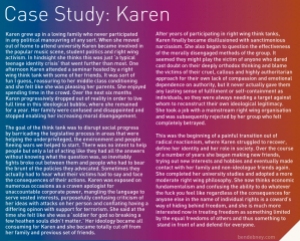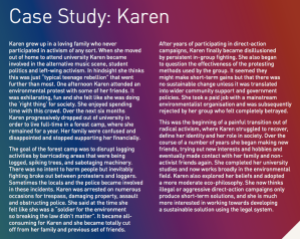 From the Australian Greens: So, the Minister for Counter-Terrorism has given education ministers “radicialisation awareness information kits” for their students to help identify warning signs of radicalisation in young people.
From the Australian Greens: So, the Minister for Counter-Terrorism has given education ministers “radicialisation awareness information kits” for their students to help identify warning signs of radicalisation in young people.
Meet Karen. Karen went to an environmental protest one afternoon with her friends. She describes it as “exhilarating, fun and she felt like she was doing the ‘right thing’ for society…”
Guess what happened next!?
Ummm….
Karen grew up in a loving family who never participated in any political manouvring of any sort. When she moved out of home to attend university Karen became involved in the popular music scene, student politics and right wing activism. In hindsight she thinks this was just ‘a typical teenage identity crisis’ that went further than most. One afternoon Karen attended a seminar hosted by a right wing think tank with some of her friends. It was sort of fun I guess, reassuring to her middle class conditioning and she felt like she was pleasing her parents. She enjoyed spending time in the crowd. Over the next six months Karen progressively dropped out of reality in order to live full time in this ideological bubble, where she remained for a year. Her family were confused and disappointed and stopped enabling her increasing moral disengagement.

The goal of the think tank was to disrupt social progress by barricading the legislative process in areas that were helping the underprivileged, the environment and people fleeing wars we helped to start. There was no intent to help people but only a lot of acting like they had all the answers without knowing what the question was, so inevitably fights broke out between members of the think tank and people who had to bear the brunt of the policies they advocated. Sometimes they actually had to hear what their victims had to say and face the consequences of their actions. Karen was exposed on numerous occasions as a craven apologist for unaccountable corporate power, mangling the language to serve vested interests, purposefully confusing criticism of her ideas with attacks on her person and identifying differences of opinon with support for terrorism. She said at the time she felt like she was a ‘soldier for god so breaking a few heathen souls didn’t matter.’ Her ideology became all consuming for Karen and she became totally cut off from her family and previous set of friends.
After years of participating in right wing think tanks, Karen finally became disillusioned with sanctimonious narcissism. She also began to question the effectiveness of the morally disengaged methods of the group. It seemed they might play the victim of anyone who dared cast doubt on their deeply orthodox thinking and blame the victims of their cruel, callous and highly authoritarian approach for their own lack of compassion and emotional dependence on authority, but it never actually gave them any lasting sense of fulfilment or self-containment as individuals, so they were always needing a target against whom to reconstruct their own ideological legitimacy. She took a job with a mainstream right wing organisation and was subsequently rejected by her group who felt completely betrayed.
This was the beginning of a painful transition out of radical reactionism, where Karen struggled to recover, define her identity and her role in society. Over the course of a number of years she began making new friends, trying out new interests and hobbies and eventually made contact with her family and non-ideologue friends again. She completed her university studies and adopted a more rmoderate right wing philosophy. She now thinks economic fundamentalism and confusing the ability to do whatever the fuck you feel like regardless of the consequences for anyone else in the name of individual rights is a coward’s way of hiding behind freedom, and she is much more interested now in treating freedom as something which is limited by the equal freedoms of others and thus something to stand in front of and defend for everyone.
Discover more from Ben Debney
Subscribe to get the latest posts sent to your email.

